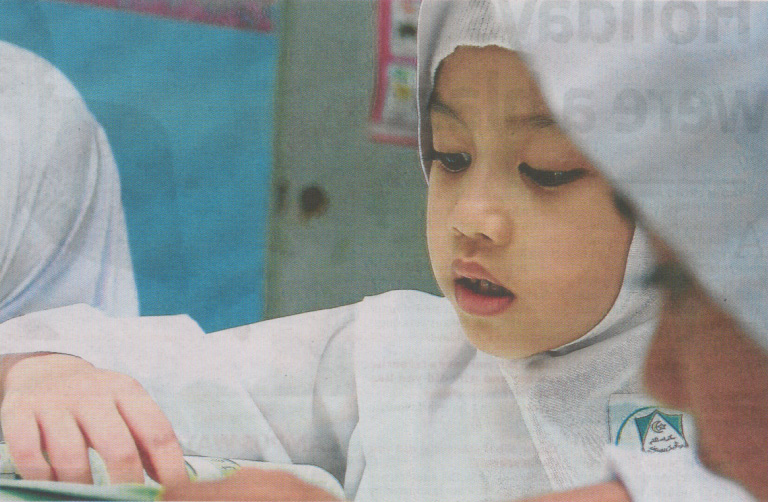The jawi script has its place
Professor Tan Sri Dato' Dzulkifli Abdul Razak
Learning Curve: Perspective
New Sunday Times - 18-08-2013
PENANG was well recognised as an intellectual hub even before the days of the British Occupation.
Like neighbouring Acheh in Sumatra, the two knowledge centres attracted a number of renowned scholars and literary figures between them.
That Tun Sri Lanang, for example, commuted between the cities is indicative of the vibrancy of the intellectual pursuit of the time.
He eventually settled in Acheh and formed a community of scholars which remains until today. He also died in Acheh and was buried there.
The local script in Acheh then was the jawi script as it is now. Tun Sri Lanang’s works are still cited in this script today.
Much of his contribution to literature, culture and the Malay world are still locked in the jawi script.

Pupils learning jawi at a school in Kuala Lumpur
The Romanised Malay script systematically implemented in the so-called formal modern education system championed by the British tends to associate jawi with religious use. This misconception seems to have grown over time.
This has a devastating impact on not only the Malay language but also its culture and heritage.
Take, for instance, the use of the word rumah sakit which is now being "modernised" by the word "hospital". This is unlike in Acheh, or indeed in Indonesia where rumah sakit is still used.
This demonstrates the flexibility of the Malay language -- rumah sakit which means tempat merawat orang sakit is no different from that of "hospital". The literal translation "sick house" has no meaning!
Similarly, menanak nasi is "cook rice" but nasi is "cooked rice". So menanak nasi is redundant and it is more appropriate to say menanak beras. In the same way, doing away with jawi will have far-reaching implications.
In the 1970s, the late Datuk Abdul Razak Abdul Hamid, the last Malaysian A-bomb survivor of the attack in Hiroshima, helmed the series of lessons Belajar Tulisan Jawi on the then RTM1.
The aim of this nationally sponsored programme was to bring back the literacy of the jawi script to the Malaysian public.
A lecturer at the School of Pharmaceutical Sciences in Universiti Sains Malaysia (USM), Penang followed the lectures and became very good in jawi. She is a foreigner of Taiwanese origin.
The programme proved very popular, with re-runs. Dewan Bahasa dan Pustaka published a book with the same title. It started a healthy learning trend.
Do not misconstrue this as an attempt to "Islamise" things just because the jawi script resembles that of the Quranic text.
So it is baffling to read of the decision by the Penang Free School (PFS) headmaster and board of governors to remove the jawi inscription of the school's name.
The reason given was to avoid confusing the public into thinking that PFS is a "religious" school. How this is possible begs to be answered.
It is the duty of the principal and the school to clarify publicly, rather than take the easy way out. It not only ruins the PFS name but also the iconic image of an institution of learning.
In case we forget, the use of the word "Free" underscores the need for a free spirit of inquiry in the world of education.
There are many bodies of a similar nature in existence even longer than PFS worldwide, yet they are not bogged down in flimsy non-academic issues as in the case of PFS. It is a blemish in the history of PFS.
In the case of USM, the jawi inscription of its name appears in documents and is clearly visible on major buildings such as Dewan Tuanku Syed Putra.
If USM and several public universities too are not creating any confusion as PFS alleged, then it is difficult to academically justify the decision taken by PFS school authorities.
PFS must re-look at living up to its long-standing reputation of intellectual rigour and the tradition of being intellectually "Free".
- The writer is the vice-chancellor of the Albukhary International University
